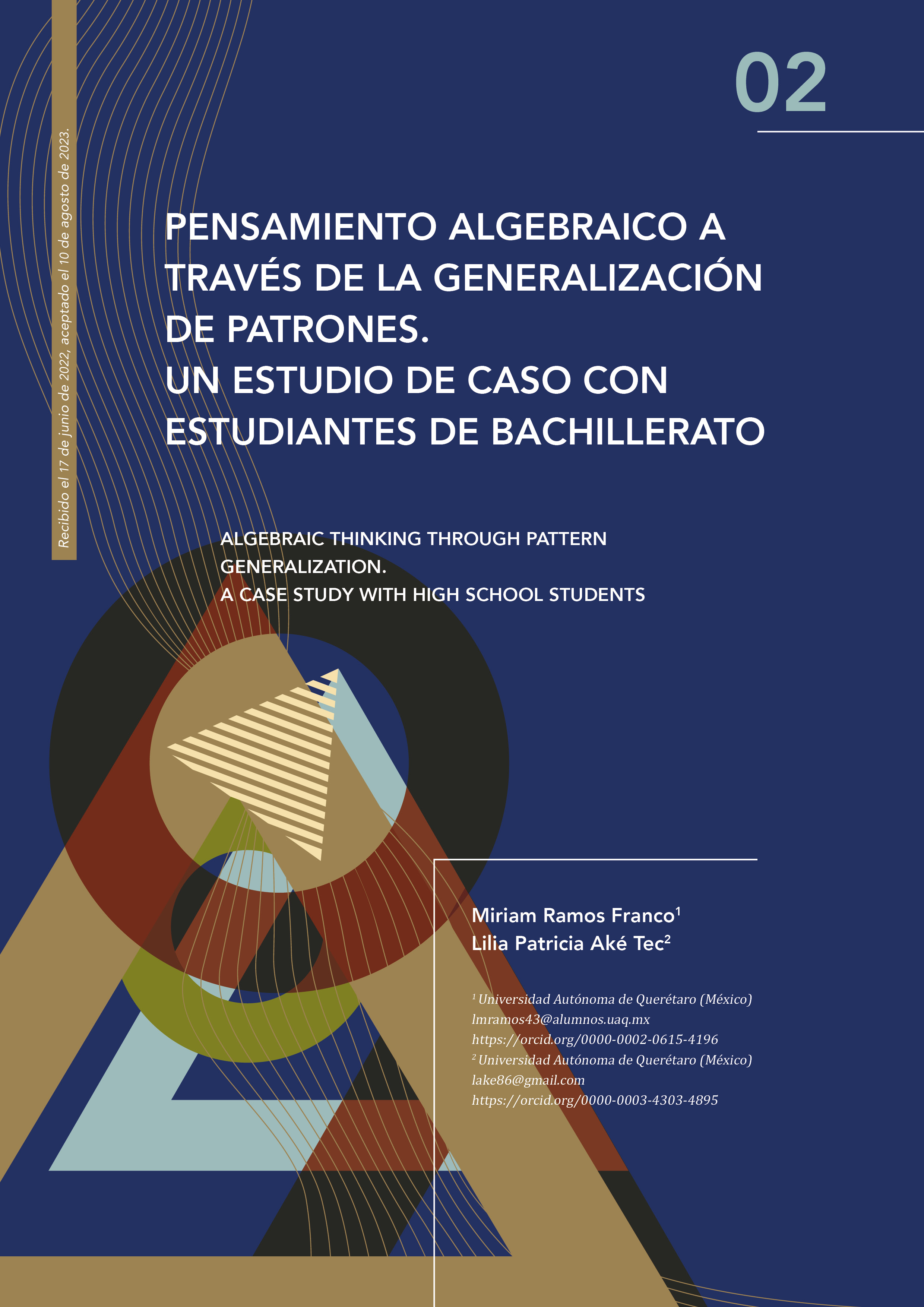Resumo
El presente estudio tiene por objetivo presentar las características del pensamiento algebraico de estudiantes de bachillerato ante la resolución de una tarea sobre generalización de patrones lineales. Como fundamento se utiliza las nociones de estrategias de generalización de patrones y los niveles de demanda cognitiva para este tipo de tareas. Estas nociones fueron utilizadas para la propuesta de la tarea y para el análisis de los datos. Se utiliza una metodología cualitativa basada en el estudio de casos que fue desarrollada con dos estudiantes de bachillerato. Como resultado se aprecia que los estudiantes utilizaron principalmente las estrategias recursivas y explícitas. En el caso del estudiante A, se identifica la dificultad en la declaración y denotación de las variables y el tratamiento algebraico. En cuanto al estudiante B, presenta menos dificultades para resolver algebraicamente la tarea. Se espera que la información generada sea útil para futuras investigaciones y para los profesores en activo que decidan implementar este tipo de tareas en el aula de clases.
Referências
Akkan, Y. (2013). Comparison of 6th-8th graders’ efficiencies, strategies and representations regarding generalization patterns. Bolema - Mathematics Education Bulletin, 27(47), 703–732. https://doi.org/10.1590/S0103-636X2013000400002
Banerjee, R. (2008). Developing a Learning Sequence for Transiting from Arithmetic to Elementary Algebra [Tesis doctoral, Tata Institute of Fundamental Research]. Homi Bhabha Centre for Science Education. https://www.hbcse.tifr.res.in/research-development/ph.d.-theses/phd-thesis-banerjee-final-10.10.08.pdf
Bautista-Pérez, J. L., Bustamante-Rosario, M. H., & Amaya, T. (2021). Desarrollo de razonamiento algebraico elemental a través de patrones y secuencias numéricas y geométricas. Educación Matemática, 33(1), 125–152. https://doi.org/10.24844/EM3301.05
Benedicto, C., Jaime, A., & Gutiérrez, A. (2015). Análisis de la demanda cognitiva de problemas de patrones geométrico. In C. Fernández, M. Molina, & N. Planas (Eds.), Investigación en Educación Matemática XXI (pp. 153–162). SEIEM.
Booth, J., McGinn, K., Barbieri, C. A., & Young, L. K. (2017). Misconceptions and Learning Algebra. In S. Stewart (Ed.), And the Rest is Just Algebra (Issue October, pp. 73–68). Springer. https://doi.org/10.1007/978-3-319-45053-7
Dirección General del Bachillerato. (2017). Matemáticas I. Programa de Estudios.
Durán, M. M. (2012). El estudio de caso en la investigación cualitativa. Revista Nacional de Administración, 3(1), 121–134. https://doi.org/10.22458/rna.v3i1.477
Gaita, R., & Wilhelmi, M. R. (2019). Desarrollo del Razonamiento Algebraico Elemental mediante Tareas de Recuento con Patrones. Bolema, Rio Claro, 33(63), 269–289. https://doi.org/10.1590/1980-4415v33n63a13
García, S. J., Segovia, A. I., & Lupiáñez, G. J. L. (2014). El Uso de Las Letras como Fuente de Errores de Estudiantes Universitarios en la Resolución de Tareas Algebraicas. Bolema, Rio Claro, 28(50), 1545–1566. https://doi.org/10.1590/1980-4415v28n50a26
López-Acosta, L. (2016). Generalización de patrones . Una trayectoria Hipotética de Aprendizaje basada en el Pensamiento y Lenguaje Variacional. [Tesis de Maestría, CINVESTAV]. Repositorio CINVESTAV.
Organización para la Cooperación y el Desarrollo Económicos. (2019). Programa Para La Evaluación Internacional De Alumnos (Pisa) Pisa 2018 - Resultados - Nota País México. OCDE, I–III, 1–12. https://www.oecd.org/pisa/publications/PISA2018_CN_MEX_Spanish.pdf
Radford, L. (2008). Iconicity and contraction: A semiotic investigation of forms of algebraic generalizations of patterns in different contexts. ZDM - International Journal on Mathematics Education, 40(1), 83–96. https://doi.org/10.1007/s11858-007-0061-0
Rico, L. (1997). Consideraciones sobre el currículo de matemáticas para educación secundaria. EMA, 1(1), 4–24.
Rojas, G. P. J., & Vergel, C. R. (2014). Procesos de Generalización y Pensamiento Algebraico. Revista Científica, 2, 688. https://doi.org/10.14483/23448350.7753
Vergel, R. (2015). Generalización de patrones y formas de pensamiento algebraico temprano. PNA, 9(3), 193–215. https://doi.org/10.30827/pna.v9i3.6220
Zapatera, L. A. (2018). Introducción del pensamiento algebraico mediante la generalización de patrones. Una secuencia de tareas para Educación Infantil y Primaria. Números Revista Didáctica de Matemáticas, 97, 51–67. http://www.sinewton.org/numeros

Este trabalho encontra-se publicado com a Licença Internacional Creative Commons Atribuição-NãoComercial-CompartilhaIgual 4.0.
Direitos de Autor (c) 2024 PädiUAQ


